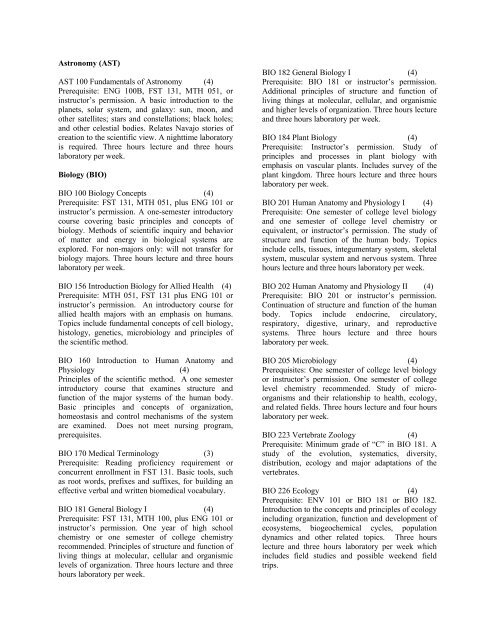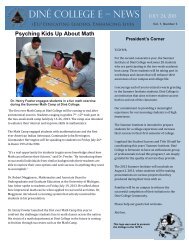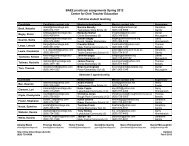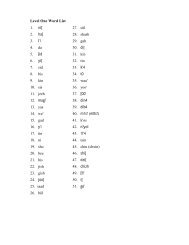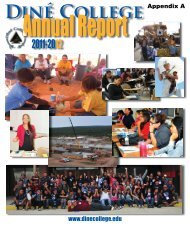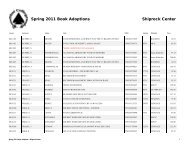Diné College Course Catalog 2008-2009 (pdf)
Diné College Course Catalog 2008-2009 (pdf)
Diné College Course Catalog 2008-2009 (pdf)
Create successful ePaper yourself
Turn your PDF publications into a flip-book with our unique Google optimized e-Paper software.
Astronomy (AST)<br />
AST 100 Fundamentals of Astronomy (4)<br />
Prerequisite: ENG 100B, FST 131, MTH 051, or<br />
instructor’s permission. A basic introduction to the<br />
planets, solar system, and galaxy: sun, moon, and<br />
other satellites; stars and constellations; black holes;<br />
and other celestial bodies. Relates Navajo stories of<br />
creation to the scientific view. A nighttime laboratory<br />
is required. Three hours lecture and three hours<br />
laboratory per week.<br />
Biology (BIO)<br />
BIO 100 Biology Concepts (4)<br />
Prerequisite: FST 131, MTH 051, plus ENG 101 or<br />
instructor’s permission. A one-semester introductory<br />
course covering basic principles and concepts of<br />
biology. Methods of scientific inquiry and behavior<br />
of matter and energy in biological systems are<br />
explored. For non-majors only: will not transfer for<br />
biology majors. Three hours lecture and three hours<br />
laboratory per week.<br />
BIO 156 Introduction Biology for Allied Health (4)<br />
Prerequisite: MTH 051, FST 131 plus ENG 101 or<br />
instructor’s permission. An introductory course for<br />
allied health majors with an emphasis on humans.<br />
Topics include fundamental concepts of cell biology,<br />
histology, genetics, microbiology and principles of<br />
the scientific method.<br />
BIO 160 Introduction to Human Anatomy and<br />
Physiology (4)<br />
Principles of the scientific method. A one semester<br />
introductory course that examines structure and<br />
function of the major systems of the human body.<br />
Basic principles and concepts of organization,<br />
homeostasis and control mechanisms of the system<br />
are examined. Does not meet nursing program,<br />
prerequisites.<br />
BIO 170 Medical Terminology (3)<br />
Prerequisite: Reading proficiency requirement or<br />
concurrent enrollment in FST 131. Basic tools, such<br />
as root words, prefixes and suffixes, for building an<br />
effective verbal and written biomedical vocabulary.<br />
BIO 181 General Biology I (4)<br />
Prerequisite: FST 131, MTH 100, plus ENG 101 or<br />
instructor’s permission. One year of high school<br />
chemistry or one semester of college chemistry<br />
recommended. Principles of structure and function of<br />
living things at molecular, cellular and organismic<br />
levels of organization. Three hours lecture and three<br />
hours laboratory per week.<br />
BIO 182 General Biology I (4)<br />
Prerequisite: BIO 181 or instructor’s permission.<br />
Additional principles of structure and function of<br />
living things at molecular, cellular, and organismic<br />
and higher levels of organization. Three hours lecture<br />
and three hours laboratory per week.<br />
BIO 184 Plant Biology (4)<br />
Prerequisite: Instructor’s permission. Study of<br />
principles and processes in plant biology with<br />
emphasis on vascular plants. Includes survey of the<br />
plant kingdom. Three hours lecture and three hours<br />
laboratory per week.<br />
BIO 201 Human Anatomy and Physiology I (4)<br />
Prerequisite: One semester of college level biology<br />
and one semester of college level chemistry or<br />
equivalent, or instructor’s permission. The study of<br />
structure and function of the human body. Topics<br />
include cells, tissues, integumentary system, skeletal<br />
system, muscular system and nervous system. Three<br />
hours lecture and three hours laboratory per week.<br />
BIO 202 Human Anatomy and Physiology II (4)<br />
Prerequisite: BIO 201 or instructor’s permission.<br />
Continuation of structure and function of the human<br />
body. Topics include endocrine, circulatory,<br />
respiratory, digestive, urinary, and reproductive<br />
systems. Three hours lecture and three hours<br />
laboratory per week.<br />
BIO 205 Microbiology (4)<br />
Prerequisites: One semester of college level biology<br />
or instructor’s permission. One semester of college<br />
level chemistry recommended. Study of microorganisms<br />
and their relationship to health, ecology,<br />
and related fields. Three hours lecture and four hours<br />
laboratory per week.<br />
BIO 223 Vertebrate Zoology (4)<br />
Prerequisite: Minimum grade of “C” in BIO 181. A<br />
study of the evolution, systematics, diversity,<br />
distribution, ecology and major adaptations of the<br />
vertebrates.<br />
BIO 226 Ecology (4)<br />
Prerequisite: ENV 101 or BIO 181 or BIO 182.<br />
Introduction to the concepts and principles of ecology<br />
including organization, function and development of<br />
ecosystems, biogeochemical cycles, population<br />
dynamics and other related topics. Three hours<br />
lecture and three hours laboratory per week which<br />
includes field studies and possible weekend field<br />
trips.


